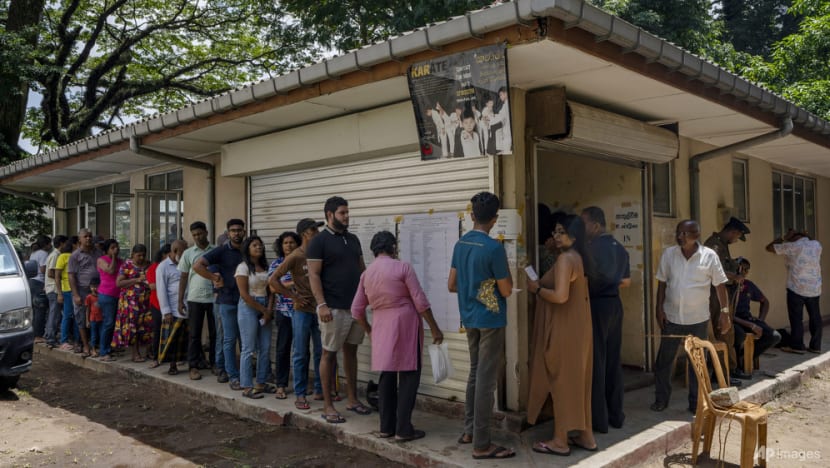Commentary: Sri Lankans made it clear they want change in a historic election
Newly elected president Anura Kumara Dissanayake struck a chord with a nation frustrated and crying out for a brighter future, says an observer.

People wait in a queue to cast their votes at a polling centre during the presidential elections in Colombo, Sri Lanka, Sep 21, 2024. (Photo: AP/Rajesh Kumar Singh)
COLOMBO: It’s a slightly scary feeling when the hotel manager calls you in your room and tells you that the police have put the whole country into curfew, and you cannot go outside. But perhaps that’s my fault for travelling to Sri Lanka during a presidential election.
This is a country that has been in crisis mode for some time. But my perspective here on the ground, (the curfew was lifted at midday Sunday, Sep 22), was that the election vibe on the streets has been nothing but peaceful, something echoed by the electoral commission.
The locals I have met have made it clear they were wanting systemic change for the country. And this was a particular message shared by my driver on the three-hour drive from Colombo to Kandy.
SRI LANKA’S ECONOMIC WOES
This is the first election since the mass protests of 2022 that ousted the country’s leader Gotabaya Rajapaksa and saw the worst economic crisis hit under his leadership. That anger for the decade-long rule of the Rajapaksa family runs deep. He is seen as the cause of the crisis blamed for mismanagement and corruption.
Straight after he fled the country, Ranil Wickremesinghe was appointed and oversaw the difficult reforms to avoid bankruptcy. He took loans from the International Monetary Fund (IMF), and countries including China, India and the Arab nations. All of this has added to Sri Lanka’s economic woes as it now sits on a massive debt burden.
And despite Wickremesinghe claiming he was the only candidate in this election that could lead Sri Lanka to economic recovery, he was only able to secure 17 per cent of the vote, making him third in the race.
There have been 38 candidates in this presidential election, none of them women. But it has really been a three-horse race between left-leaning politician Anura Kumara Dissanayake, Opposition leader Sajith Premadasa, and incumbent Ranil Wickremesinghe.
Sri Lanka has continued to suffer two past years of negative growth. Yet inflation has come down since its 2022 peak. But wages remain low, taxes high, and the poverty rate has doubled according to the World Bank. This is a nation frustrated and crying out for a brighter future.
MOOD FOR CHANGE
The mood for change was also about the fact that people were wanting to send a message that the damage that they blame Rajapaksa has left on the country must be addressed and that he must be held to account for it.
That is just one of the platforms that the Sri Lankan president-elect Anura Kumara Dissanayake (popularly known by his initials AKD) has stood for - good governance and ending fraud, corruption and waste.
His grassroots campaign also included reforming the enlarged parliament and increasing economic development. The resulted in him securing 42.31 per cent of the vote, which gave him the majority to win, after a second round of voting, the first time that had occurred in Sri Lanka’s history.
AKD’s platform has created waves across the country turning voter disillusionment into a sign of hope for the nation’s future. It has particularly hit a chord with younger voters who were excited to vote for their new president after being part of the movement to force the unpopular Rajapaksa from office in 2022 and flee the country.
Premadasa who came a close second also campaigned against “those who robbed the country”, which also hit a chord especially with those in rural communities.
My driver to Kandy was angry that Sr Lanka was not progressing economically and the government was instead bringing in “unnecessary imports such as fuel, and fish from the Maldives and eggs from India, when we have fish and sun and soil here”.
He felt the country had gone back at least a decade. He shared how he had slept outside the fuel station during the 2022 crisis waiting days for fuel, along with other shortages of goods and power blackouts.
But a change of presidency won’t bring a quick fix to Sri Lanka’s debt woes. The IMF loan has strict conditions that have created harsh realities for Sri Lankans.
My driver knows that “magic won’t happen overnight” but with a change of leader who has campaigned against the mismanagement and corruption, he, like many, are hoping that Sri Lanka’s future under Dissanayake will be a little brighter than it was yesterday. I hope they are right.
Lisa Singh is a former Australian senator and Chief Executive Officer at the University of Melbourne’s Australia India Institute. This commentary first appeared on Lowy Institute’s blog, The Interpreter.













